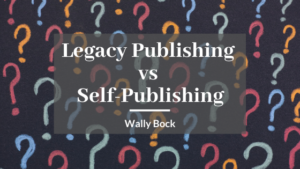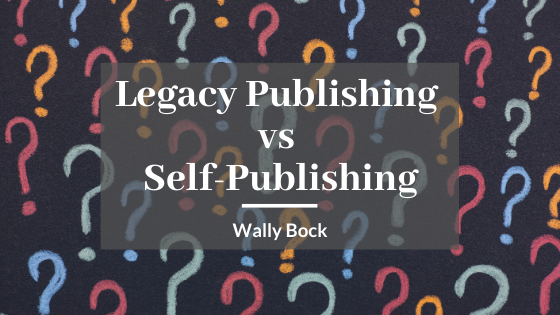 My relationship with most of the people who become clients starts with my free Options Review Session. That’s where I answer any questions that they have about the book-writing and publishing process. People ask a lot of questions. But almost everyone asks about the difference between legacy publishing and self-publishing.
My relationship with most of the people who become clients starts with my free Options Review Session. That’s where I answer any questions that they have about the book-writing and publishing process. People ask a lot of questions. But almost everyone asks about the difference between legacy publishing and self-publishing.
I get emails about this, too. A recent one from Carla put it this way: “I’ve read so much stuff about the difference between using a legacy publisher and self-publishing. I think my head will explode. Can you help me with a simple comparison?”
Sure. At least I’ll give it a try.
The Process Is Different
If you’re going to self-publish, you start by writing your book. Then, you take it through the process of publishing. I’ve outlined that in more detail in a free white paper.
If you want to go with a legacy publisher, you start by selling your book idea. The first thing you write is a book proposal. You find an agent and sell the book idea to a publisher. You sign a contract. Finally, you write the book to conform to the contract.
The Person Who Writes the Checks Makes the Choices
Just like in most of life, if you write the checks, you get to make the choices. If someone else writes the checks, they get to make the choices.
In legacy publishing, the publisher writes the checks. The publisher writes the checks to pay for editors and proofreaders and designers and marketing costs. The publisher pays cover and interior designers. The publisher writes checks to you in the form or royalties, or more rarely, an advance.
If you self-publish, you’re the publisher. And that means you write the checks. You write the checks for editors and proofreaders and designers. You’re responsible for arranging for printing and getting ISBN numbers and marketing the book. You must either do everything yourself or hire someone to do them.
Publishing Is A Complicated Craft
Publishing is complicated. There are lots of moving parts. There are lots of tradeoffs. And, the odds are that publishing is not something you do well. In fact, the odds are that if you’re reading this blog post, you haven’t done any of the tasks before.
That can be a problem. You must either learn how to do the various tasks that go into publishing or hire people to do them for you. You must judge the quality of all the work.
Some Results of These Truths
You will almost always get a book to market faster publishing it yourself instead of going through a legacy publisher. The legacy publisher has a selection process for a reason. The publisher is investing money in you, your idea, and your ability to execute it. Vetting you takes time. You may have to approach several publishers and revise your book proposal.
Then, your book needs to fit into the annual publishing cycle. It needs to go into the publisher’s catalog. It will probably be released on a date the publisher thinks will make it successful. You have no control over that.
If you self-publish, you probably don’t know what you don’t know. You can learn a lot from reading books and blog posts and white papers. But there are many choices and tradeoffs.
Far too many self-publishers make cost one of their only decision tools. That means they may cut an entire process, like editing or proofreading. It means they may select a generic cover rather than having one designed by a book cover designer. That usually results in disaster.
Bottom Line
The main difference between self-publishing and legacy publishing is who writes the checks. Legacy publishing will not cost you as much money, but you’ll give up some control and probably speed to market. If you self-publish, you must do everything required to produce a great book, either by doing it yourself or by hiring someone to do it. The danger is that you don’t know what you don’t know. That’s why you’ll probably want to ask for help.
